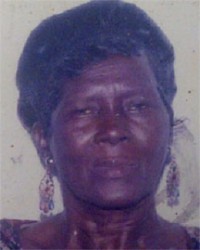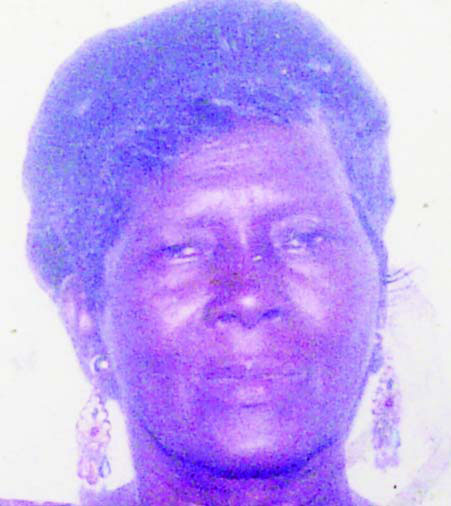DNA samples taken in the Millicent Prince-Cummings rape/murder investigation are still at a lab in Brazil, more than a year after they were sent there as part of an agreement between the two countries which should have ensured speedy results.
The 90-year-old Prince-Cummings’s semi-nude body was found beneath an abandoned

house over two years ago, in April 2013. A total of nine men had been arrested, but police later took samples from three of them to see whether traces of their DNA would have been found on the elderly woman.
For Roxanne Myers, the elderly woman’s great niece the lengthy delay is “extremely disappointing” and “totally ridiculous”. Stabroek News had tried, over the last few months, to get answers from Crime Chief Leslie James as regards these samples as well as others which were sent to the neighbouring country in February 2014 but got nothing.
Myers recalled that former Crime Chief and current Commissioner Seelall Persaud had given her all assurances that there would be a vigorous investigation. But this was not to be as according to her it was her relatives who went around the area acting on leads and subsequently passed information to the police. That was how the nine persons came to be arrested, she said. “The police did zero investigation,” she said while explaining that often the excuse was that there were no vehicles available to transport ranks.
She said that she has not been able to make contact with Persaud for some time now but from all indications no results have been uplifted by the police.
Myers said that she is in disbelief that so much time has passed since her aunt’s death and since the samples were sent abroad, all the while lessening hope that killer(s) will be identified and charged.
She recalled that in the beginning, the family had offered to pay for the DNA testing to be done but was told that it could not happen.
“The family wanted to pay for it but he [Persaud] said no it is a state matter,” she said before disclosing that they were subsequently informed that the samples were being sent to an overseas lab.
Guyana does not have the capability to conduct such scientific tests and as such a number of overseas labs have been used in this regard. Samples were sent to Jamaica, Trinidad and Barbados previously.
“I am disappointed that it is taking so long. It is unacceptable what has happened,” the woman told Stabroek News. She noted that what is particularly disturbing is that there is no alternative or second recourse for the family as without the samples being tested the case can go nowhere.
“They said that they were working on the DNA. They have no eyewitnesses nothing,” she stressed. She said the case hit a brick wall because persons did not want to come forward. According to her, a man who worked a stone’s throw away from where the elderly woman was found claimed that he did not hear or see anything prior to the discovery of the body.
Prince-Cummings, a mother of one, was found beneath the house around 05:30 hrs on April 12 with her head bashed in.
She was exposed from her waist down. A post-mortem examination later revealed that she had been sexually assaulted and that she sustained blunt trauma to the head.
A condom packet, believed to be linked to the crime and which was found close to the body, is at the police crime lab. It is unclear if this will also be sent abroad for DNA testing.
From all indications, the woman was attacked shortly after she left her home on the public road at Cove and John, East Coast Demerara for her usual early morning walk.
She was heading in the direction of Victoria and could have been attacked as she passed the abandoned house. It is believed that she was dragged beneath the building which is located next to a cemetery.
Neighbours did not recall hearing anything suspicious.
It was a man who resided at a back house who discovered the woman while on his way out of the yard; he was on his way to work. The man and other persons who occupied his home (the back house) were detained and questioned for several hours before being released.
Prince-Cummings’s nephew Quinn Prince while slamming police for their poor work had expressed belief that three men had committed the act.
According to him, a bus driver had recalled passing three men standing with the elderly woman on the roadside near the house where she was later found dead.
He said the driver went to the gas station at the Victoria and when he passed back the three men and the woman were not there. About five minutes would have elapsed from the time the driver passed to when he passed back.
Unreliable?
In November 2013, Persaud had informed this newspaper that forensic samples taken in at least ten murder cases were to be transported to Brazil under a new arrangement with that country. He said the samples were from cases on a priority list. Among the cases on the list were the Anna Catherina triple murder, the murder of Prince-Cummings and the Sparendaam plane crash which claimed the lives of two foreigners.
He had expressed confidence that the wait for the results would not be long.
Since then, there has been no word on the results and no mention of other samples being sent there. Instead, subsequent DNA samples from two cases—missing school teacher Ngozi Goodman and the suspected decomposing remains of well-known businessman Mohamed Khan—were sent to a lab in Trinidad.
Observers had questioned the switch to the twin-island Republic when the force had boasted of a good arrangement between Guyana and Brazil.
Stabroek News has been unable to contact the Commissioner since he took office for an update on the Brazil samples and to ascertain why a decision was taken to switch to the lab in Trinidad.
A security source opined that the force may have realized that it had again come face to face with an unreliable lab. Though the lab in Trinidad did take some time to deliver the Goodman and Khan results, the length of time was nowhere close to a year.





